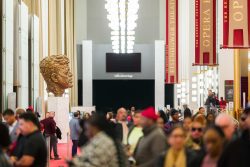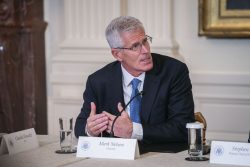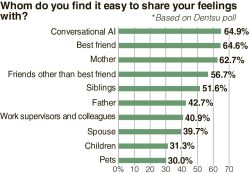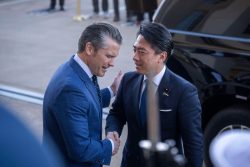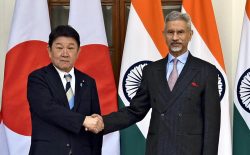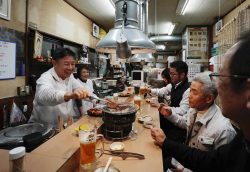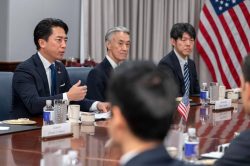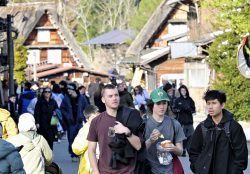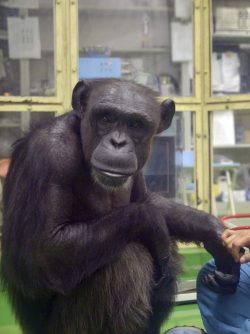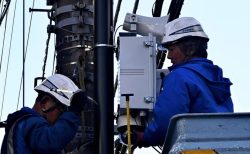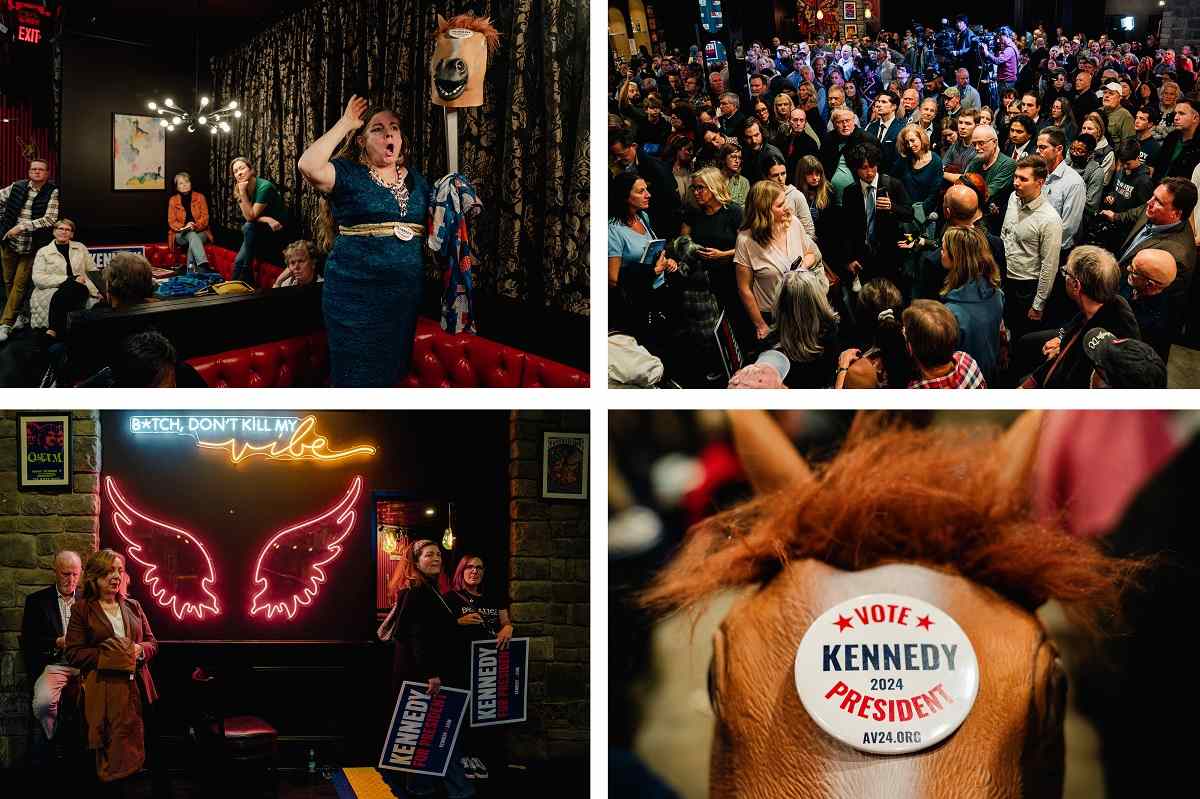
Scenes from the RFK Jr. campaign event in Annapolis on Nov. 6.
12:59 JST, November 19, 2023
CORRECTION: In an earlier version of this story, Robert F. Kennedy Jr. said his brothers Max Kennedy and Douglas Kennedy support his presidential campaign. Since the story published, Max Kennedy contacted The Post to say he does not support his brother’s campaign and is supporting the reelection of President Biden. This story has been updated.
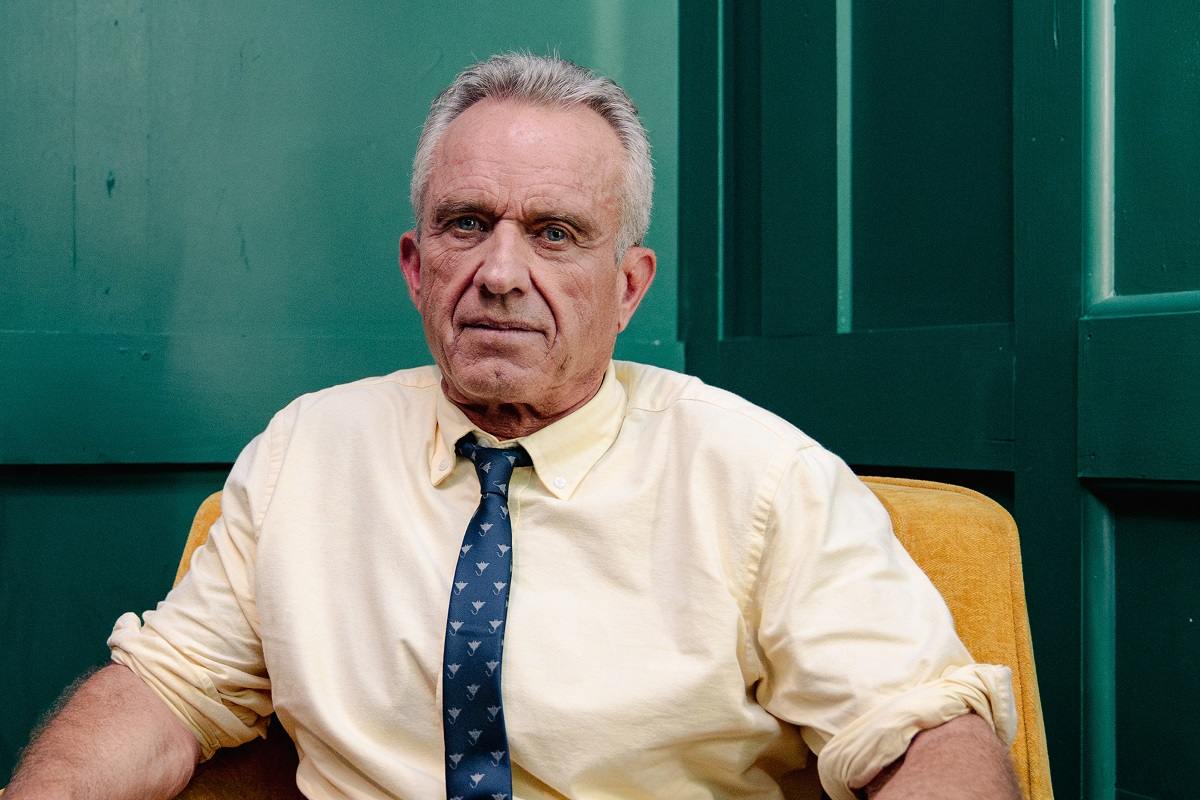
Robert F. Kennedy Jr. in Annapolis, Md., on Nov. 6.
***
Perhaps Camelot, as a political metaphor, used to feel like an actual castle: sturdy stone walls, beautiful gardens and admirers strolling on hallowed grounds tended by generations of Kennedys, ever since Jackie first verbalized the symbolism in the days after her husband’s assassination.
But at the moment, you might argue that Camelot is represented not by a turreted castle but by a squat nightclub named Vibe outside of Annapolis, Md., where disco balls illuminated the eager faces of hundreds gathered last week to see the most prominent – or most visible – member of the family, Robert F. Kennedy Jr., who is now running an independent campaign for president.
Inside, “BOBBY! BOBBY!” chants broke out as people waited for him to arrive. Some took pictures with a backdrop that said “Kennedy 24: Declare Your Independence.” Some took pictures with a neon sign that read “B*tch, don’t kill my vibe.”
There are dueling visions of Camelot competing for Americans’ attention this month, which marks 60 years since President John F. Kennedy was killed. On one side are the documentaries and public memorializing of Kennedy and his legacy. On the other side is his 69-year-old nephew, RFK Jr., who has spread falsehoods about vaccines and, according to the New York Post, claimed that the coronavirus was “targeted” to sicken Black and Caucasian people and spare Chinese people and Ashkenazi Jews (RFK Jr. said that those comments were misinterpreted to smear him).
“There’s a nice Maryland connection to the Kennedy family,” said Josh Mazer, the campaign’s Maryland chairman, introducing the candidate at Vibe. “Our lovely and classy former first lady, Kennedy Kathleen Townsend” – actually, former lieutenant governor Kathleen Kennedy Townsend – “is a resident. We love her very much. We hope she’s doing well. We hope she votes for Bobby.”
The crowd laughed. Townsend will not be voting for Bobby.
She, along with three of her siblings, issued a statement last month when he relaunched his campaign as an independent, after starting as a Democrat. They called their brother’s run “dangerous to our country,” and said that “Bobby might share the same name as our father, but he does not share the same values, vision or judgment. Today’s announcement is deeply saddening for us. We denounce his candidacy and believe it to be perilous for our country.” Its co-signatories are Rory Kennedy, Kerry Kennedy and Joseph P. Kennedy II.
The collective keepers of the Camelot legacy are worried, and maybe for good reason. A Quinnipiac University national poll released this month found evidence, however momentary, that RFK Jr.’s vision is resonating – and/or voters are unhappy with their mainstream choices: 22 percent supported RFK Jr. in a hypothetical three-way race against President Biden and former president Donald Trump.
“If I get 34 percent in the battleground states, I can win those electors,” RFK Jr. told the crowd at Vibe. “It’s winner take all. So in a three-way race, all I have to do is beat the other two by a point.” He made it seem so simple, so destined, this plan for a second Kennedy White House, 60 years after the first ended in tragedy. He told the crowd: “This is very doable.”
In the green room later, when asked to reflect on the blessings and burdens of growing up Kennedy, RFK Jr. demurred. “It was all blessings,” he said. Then he steadily grew more exasperated with the line of questioning, until he asked to go off the record to say what he really felt.
***
What does it mean to be a Kennedy in 2023? It means inheriting wealth, privilege and a patrician duty to one’s country. It means people constantly asking about your family, no matter how much you’d like to stand on your own. It means generational trauma and intense scrutiny. It means having to hear and ignore any number of conspiracy theories. (Some QAnon believers say that John F. Kennedy Jr. is alive – he died in a plane crash in 1999 – and will be Trump’s running mate in 2024.)
RFK Jr. is the fourth Kennedy in his family to run for president – fifth if you include his uncle by marriage, Robert Sargent Shriver Jr., who ran unsuccessfully for the Democratic nomination in 1976.
Three Kennedys are currently serving in the administration that RFK Jr. hopes to dislodge: Caroline Kennedy (his cousin) is ambassador to Australia, Victoria Reggie Kennedy (widow of his uncle Ted) is ambassador to Austria, and Joe Kennedy (his nephew) is the special envoy to Northern Ireland.
But did you even know this? Perhaps you’ve heard more about RFK Jr.’s shirtless push-up videos, or his falconry or the recent TMZ report about his barefoot walk to and from an airplane bathroom.
The Kennedys are “receding into history with each passing year,” says Larry Sabato, director of the Center for Politics at the University of Virginia. Sabato asks his students every year if they know what Camelot means in relation to the Kennedy family. Out of 150 or so students, usually around three raise their hands.
The notion of Camelot, as it relates to the Kennedys, came from an interview that the grieving Jacqueline Kennedy gave to Life Magazine, published two weeks after her husband’s assassination. She recalled listening to the record of the musical “Camelot,” about King Arthur, with the president at night, and quoted some lyrics: “Don’t let it be forgot, that once there was a spot, for one brief shining moment that was known as Camelot.”
“There’ll be great presidents again,” she told Life, but “there’ll never be another Camelot again.”
For a shocked and saddened country, the mythical encomium was a balm that hardened into a foundation of nostalgia and revisionist history. It imbued the Kennedy family with a sheen of faux royalty, even through times of scandal and tragedy (so many tragedies). As an aesthetic, it has persevered: A new book about the style of JFK Jr.’s wife Carolyn Bessette Kennedy – who also perished in the plane crash in 1999 – celebrates the enigmatic blonde fashion publicist as “the Camelot bride.”
Jackie’s attire remains the gold standard for political spouses who want to convey respectability. Florida’s first lady Casey DeSantis, who has a penchant for capes and elbow-length gloves, has been accused of Kennedy cosplay, earning herself the nickname “Jackie No.”
Over time, though, “the Camelot image became – what would be the word for it?” muses James Piereson, author of “Camelot and the Cultural Revolution.” He arrives at: “A little bit corny. Schmaltzy. And not really appropriate for a kind of a cynical and sophisticated public that emerged in the 1970s.”
America is good at making a myth but better at tearing it down, and the Kennedys sometimes abetted their own dishonor. JFK, we now know, was a womanizer with a reckless streak. A year after Robert F. Kennedy’s assassination, his brother Ted drove off a bridge on Chappaquiddick Island. The crash killed former RFK campaign worker Mary Jo Kopechne; Ted waited 10 hours to alert the police.
RFK Jr.’s branch of the family tree has suffered more than many of the others: At 14, he was a pallbearer at his father’s funeral. His brother David died of a drug overdose in 1984 and his brother Michael died in a skiing accident in 1997. Mary Richardson, his ex-wife and mother of four of his children, died by suicide in 2012.
Perhaps because they have suffered so much, “the Kennedys are famously clannish and they don’t like to call one another out,” says Sabato, who is friendly with several members of the family. “Certainly not in public.”
Which makes their condemnation of RFK Jr.’s campaign all the more notable. In addition to the statement from four of his siblings, other family members have made clear their views on RFK Jr.’s controversial opinions.
“My uncle’s comments were hurtful and wrong,” former congressman Joe Kennedy tweeted after RFK Jr.’s remarks about covid-19. “I unequivocally condemn what he said.”
“His statements do not represent what I believe or what Robert F. Kennedy Human Rights stand for,” wrote sister Kerry Kennedy, who runs the foundation named after her father, in July.
RFK Jr. wrote on X, formerly Twitter, that his comments about covid and Jews were misunderstood, and that the journalist who reported them “exploited this OFF-THE-RECORD conversation to smear me by association with an outlandish conspiracy theory.”
In a USA Today opinion column, cousin Patrick J. Kennedy argued that the current president is the keeper of the Kennedy flame: “Robert F. Kennedy Jr. claims to follow in JFK’s footsteps. Biden actually is.”
In an email response to The Washington Post, RFK Jr.’s niece Kerry Kennedy Meltzer, a doctor, wrote: “One of the great privileges of being a member of my family is that I’m surrounded by people who fight for what they believe in. . . . Those are values that helped me decide to become a physician. They’re also among the reasons I’ve found it hard to have an uncle who is publicizing conspiratorial views about vaccines and public health – ones that I believe will harm Americans. A lot of people have uncles who say offensive and untrue things, but my uncle Bobby is a candidate for president. It’s something I can’t ignore.”
Strong words have also come from Jack Schlossberg, JFK’s only grandson, and son of Caroline Kennedy. In an Instagram reel, Schlossberg listed Biden’s achievements and condemned his cousin’s candidacy.
“He’s trading in on Camelot, celebrity, conspiracy theories and conflict for personal gain and fame,” Schlossberg said. “I’ve listened to him. I know him. I have no idea why anyone thinks he should be president.”
He later doubled down in an interview on the “Today” show alongside his mother.
“I’m very glad I did it. I stand by what I said in my video,” Schlossberg told host Savannah Guthrie. “I love my family and I’m very proud of our legacy of public service.”
“These were harsh words though, Jack,” said Guthrie. “I mean, you said he’s using Camelot. He’s essentially abusing the family name in a way.”
Guthrie then addressed Caroline: “And is it complicated right now? Given this situation, you obviously are – “
“Not complicated,” said Caroline.
“Why not?”
“Why not? Because I know what I think. I know what Jack thinks. I know what Bobby Kennedy thinks. And so, um, it’s not complicated.”
***
Does her cousin agree?
“I have a great relationship with my family,” said RFK Jr., standing in the green room after taking hundreds of selfies with the adoring crowd at Vibe.
He had taken off his jacket and rolled up his sleeves. After putting in a dinner order with his staff – chicken, potato salad, coleslaw and jelly to go with the chicken – he sat in a mustard-yellow chair. His communications director, who was present, had been told the topic of the conversation in advance, but it was clear RFK Jr. was not thrilled.
“We were raised to, you know, to debate, and argue with each other . . . but to do it congenially and to be able to differ with each other on issues,” he said in his low, gravelly voice, the product of a neurological condition called spasmodic dysphonia.
Asked which family members support his campaign, he listed his cousin Anthony Shriver – founder of Best Buddies, a nonprofit that supports children with intellectual and physical disabilities – and his younger brothers Max and Douglas. Neither brother responded to The Post’s attempts to reach them for comment, but after this story published online, Max Kennedy contacted The Post to say he does not support his brother’s campaign and that he supports Biden.
“I think there are now 105 members of my family,” said RFK Jr., “And I would say that they’re probably evenly divided, those who support me and those who are less supportive.”
And what does the notion of Camelot mean to him now?
“I’m not going to comment on that,” he said, curtly. This was shortly before he asked to speak off the record, and once agreed to, unleashed some of his thoughts.
Who could blame Kennedy for being upset? It must be unpleasant to spend your life answering intermittent questions about the glories and tragedies in your family, when you’d much rather talk about your accomplishments – how you cleaned up the Hudson River, for example, and sued Monsanto. But where would his candidacy be without the Kennedy name? He invokes his family legacy when it’s convenient for him. He positions himself as heir to his forebears’ aspirations.
“If you go down the checklist of things that my uncle and father believed in, I would check every box,” he said.
Some of the things that RFK Jr. believes in: Discontinuing U.S. support for Ukraine. Discrediting vaccines, which he has falsely claimed can cause autism. Bitcoin. A vague “they” – the establishment, the banks – that is sinister and all-controlling.
“They have us all at each other’s throats,” he told the crowd at Vibe. “They have a formula.”
Mike Barnicle has been a friend of the family for decades, and has known RFK Jr. for most of his life.
“He is very smart. He is very complicated,” says Barnicle, a political commentator who worked as a volunteer for RFK Sr.’s presidential campaign in 1968. “No matter what he says, no matter how bizarre, crazy or flat out wrong it is, he believes it. He’s not making it up.”
But the question Barnicle can’t answer is: Why is RFK Jr. like this?
How did a man with the ultimate insider name become a controversial outsider candidate?
Armchair psychologists talk about post-traumatic stress disorder, about the personal weight of family assassinations, about conspiracy theories used to order the chaos of a violent America. One of the conspiracy theories that RFK Jr. promotes is that the CIA, not a lone gunman, was responsible for his father and uncle’s deaths. RFK Jr. supported the parole of Sirhan Sirhan, the man convicted of killing his father, when many of his siblings opposed it.
A majority of Americans think there was a conspiracy, at least when it comes to his uncle. A Gallup poll released Monday found that 65 percent of U.S. adults believe that Lee Harvey Oswald did not act alone in the assassination of President John F. Kennedy.
The campaign trail has a way of bringing back traumatic memories. In September, a man was arrested for bringing a gun to an RFK Jr. campaign event. Last month, another man was arrested for attempting to break into the Los Angeles home that the candidate shares with his wife, actress Cheryl Hines. RFK Jr. and his private security detail requested Secret Service protection. It has not yet been granted.
“His courage to be here and have events like this, even with his own security is amazing. I mean, it really speaks to someone who really cares deeply about what they are looking to create,” said Heather MacMillan, 50, an RFK Jr. supporter at the Annapolis event. She was vague about what she saw in him, saying, “I’m primarily interested in statesmen coming to the fore in this country.”
Kennedy’s meandering speech at Vibe addressed homelessness, U.S. aid to Ukraine and the political influence of corporations such as BlackRock and State Street. He spoke of his children, who went to “great colleges and they have good jobs, but none of them are looking for a home and none of their friends are. They’re figuring out how to pay their college debt. And the idea of owning a home is totally out of reach.” (Forbes estimates that RFK Jr.’s net worth is approximately $15 million.)
He pledged that in his first week as president, he would “dramatically reduce” the National Institutes of Health’s research into infectious diseases.
“Hang Fauci!” a supporter yelled.
His audience seemed inclined to support him because they, too, have been dismissed – sometimes by their own family.
Said supporter Alan Chavis, 65, a truck driver from Baltimore: “I got family members that won’t talk to me.”
"News Services" POPULAR ARTICLE
-

Japan’s Princess Kako Marks 31st Birthday, Contributed to Key Events This Year
-

Arctic Sees Unprecedented Heat as Climate Impacts Cascade
-
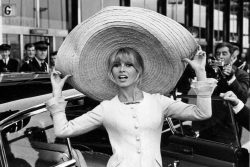
Brigitte Bardot, 1960s Sultry sex Symbol Turned Militant Animal Rights Activist Dies at 91
-

At Least 7 Explosions and Low-Flying Aircraft Are Heard in Venezuela’s Caracas
-

South Korea Prosecutor Seeks Death Penalty for Ex-President Yoon over Martial Law (Update)
JN ACCESS RANKING
-

Japan Govt Adopts Measures to Curb Mega Solar Power Plant Projects Amid Environmental Concerns
-
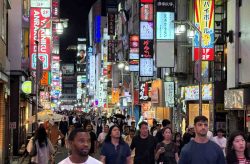
Core Inflation in Tokyo Slows in December but Stays above BOJ Target
-

Major Japan Firms’ Average Winter Bonus Tops ¥1 Mil.
-

Tokyo Zoo Wolf Believed to Have Used Vegetation Growing on Wall to Climb, Escape; Animal Living Happily after Recapture
-

JAL, ANA Cancel Flights During 3-day Holiday Weekend due to Blizzard


